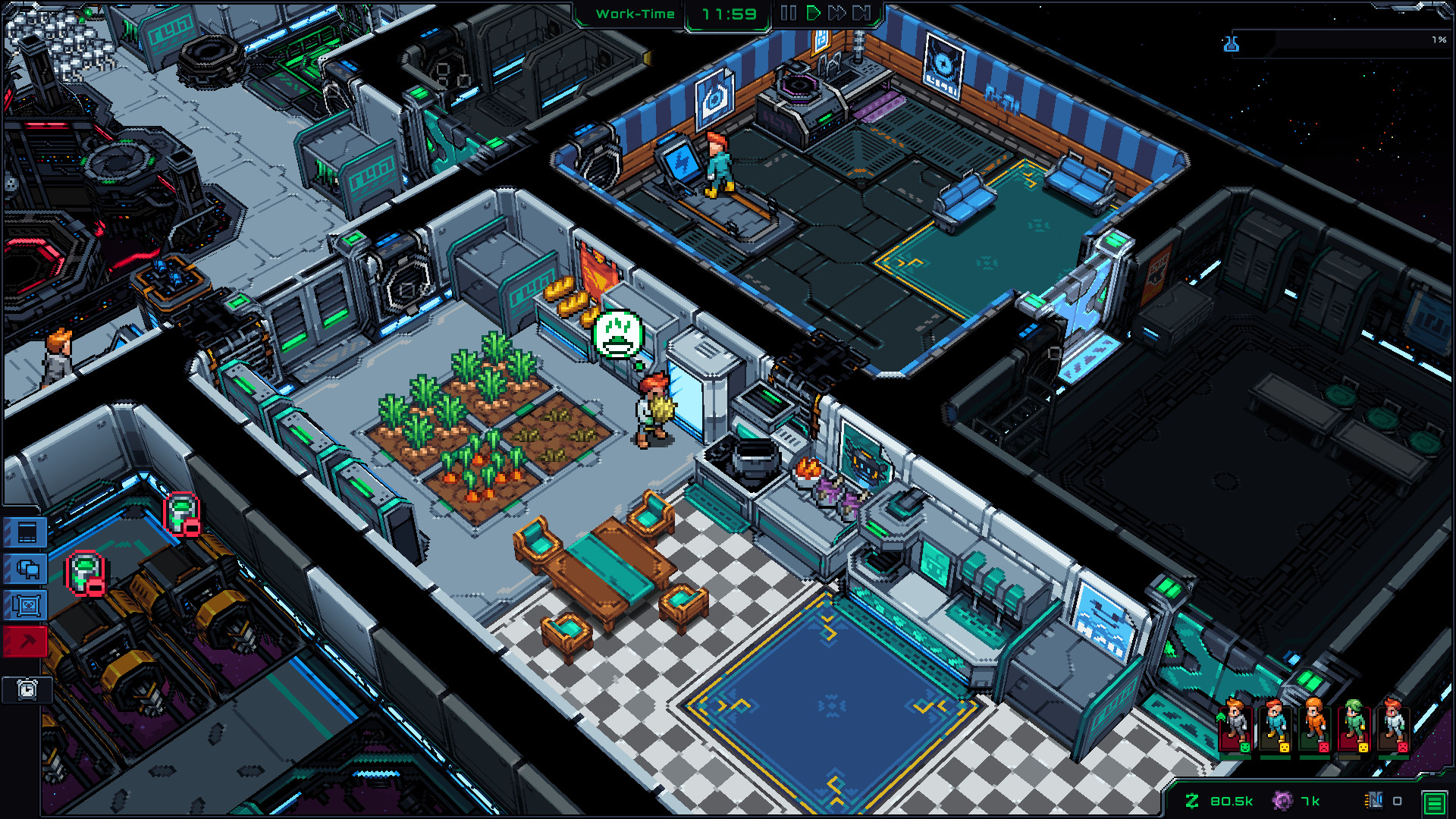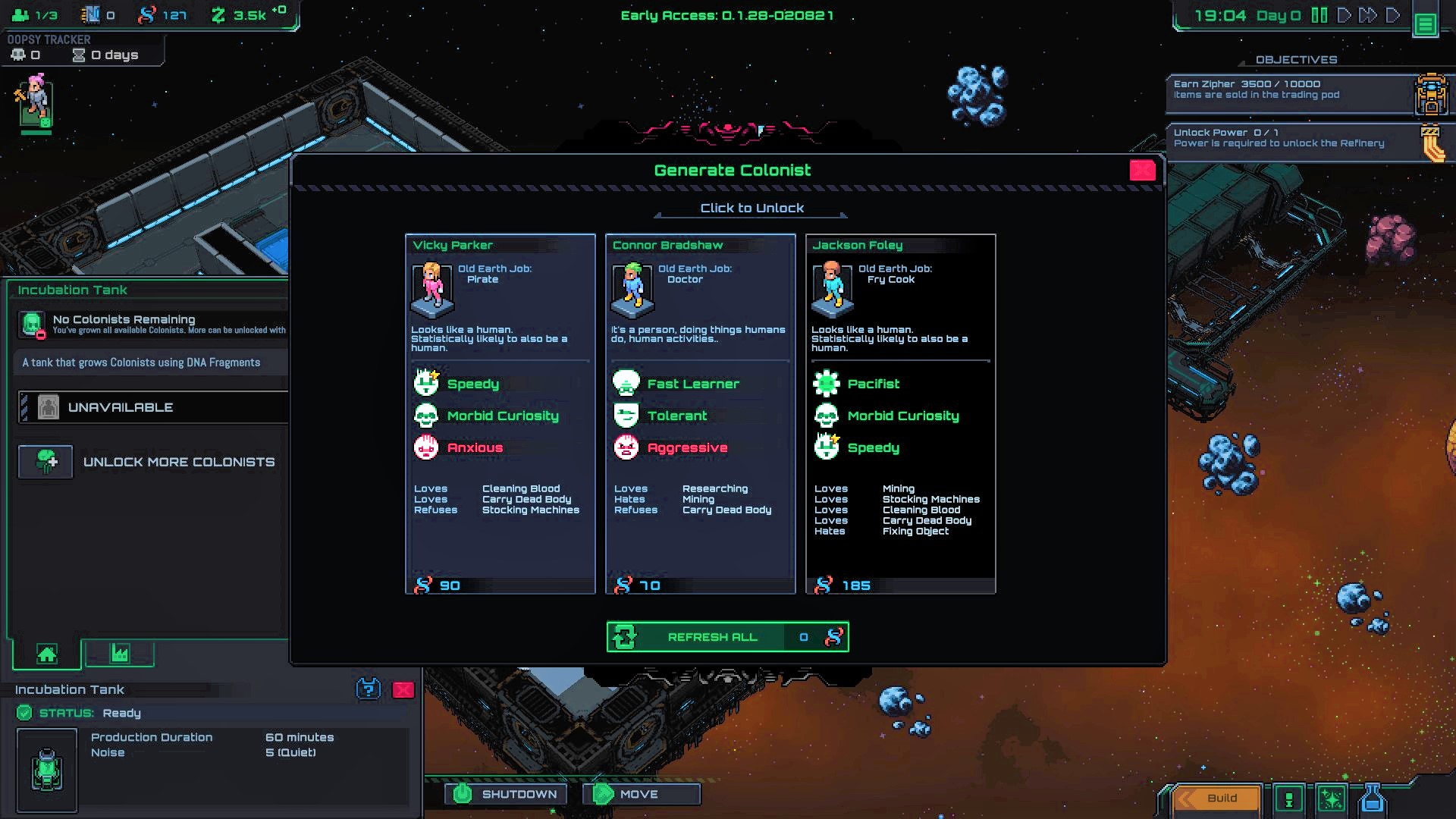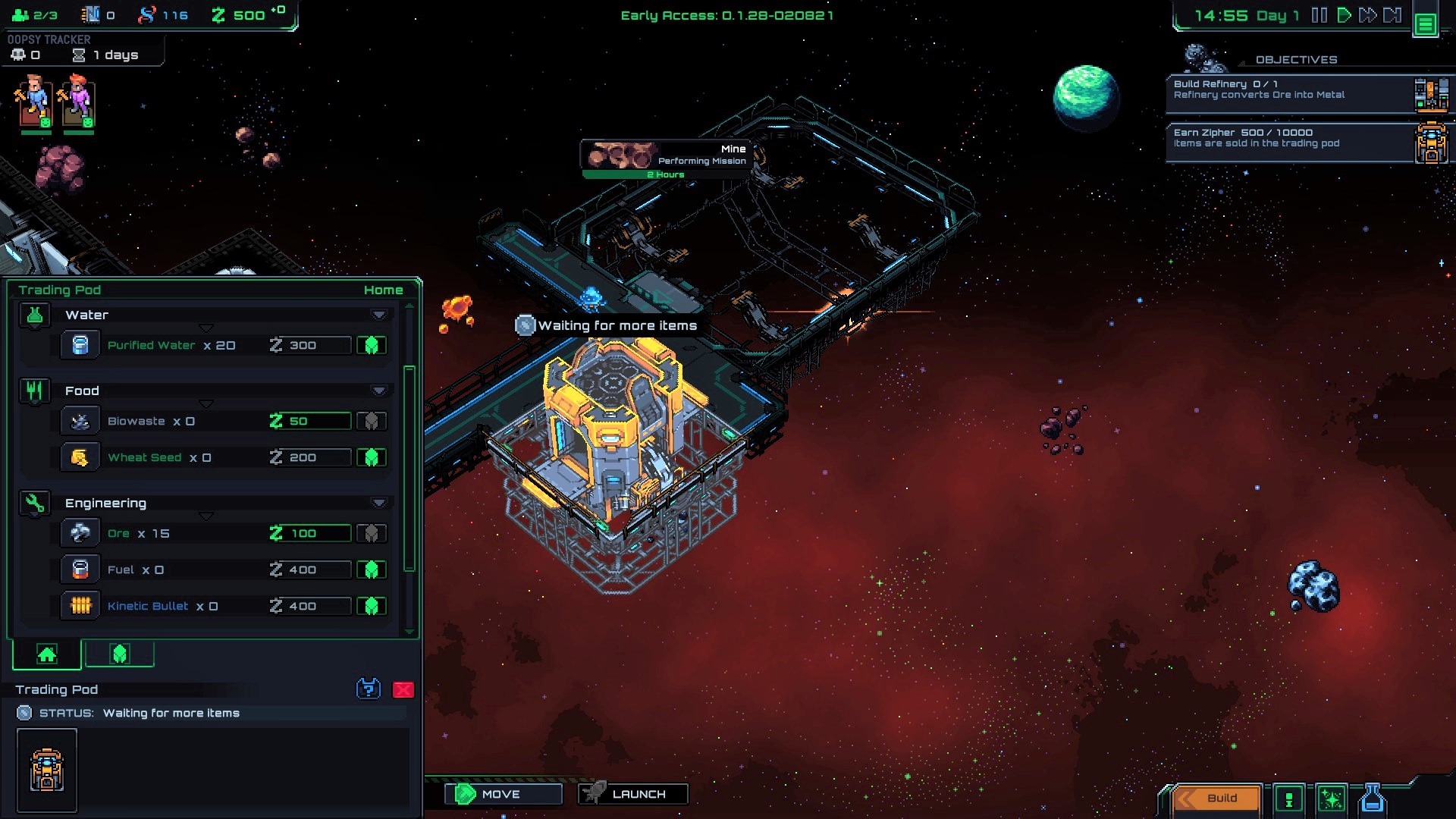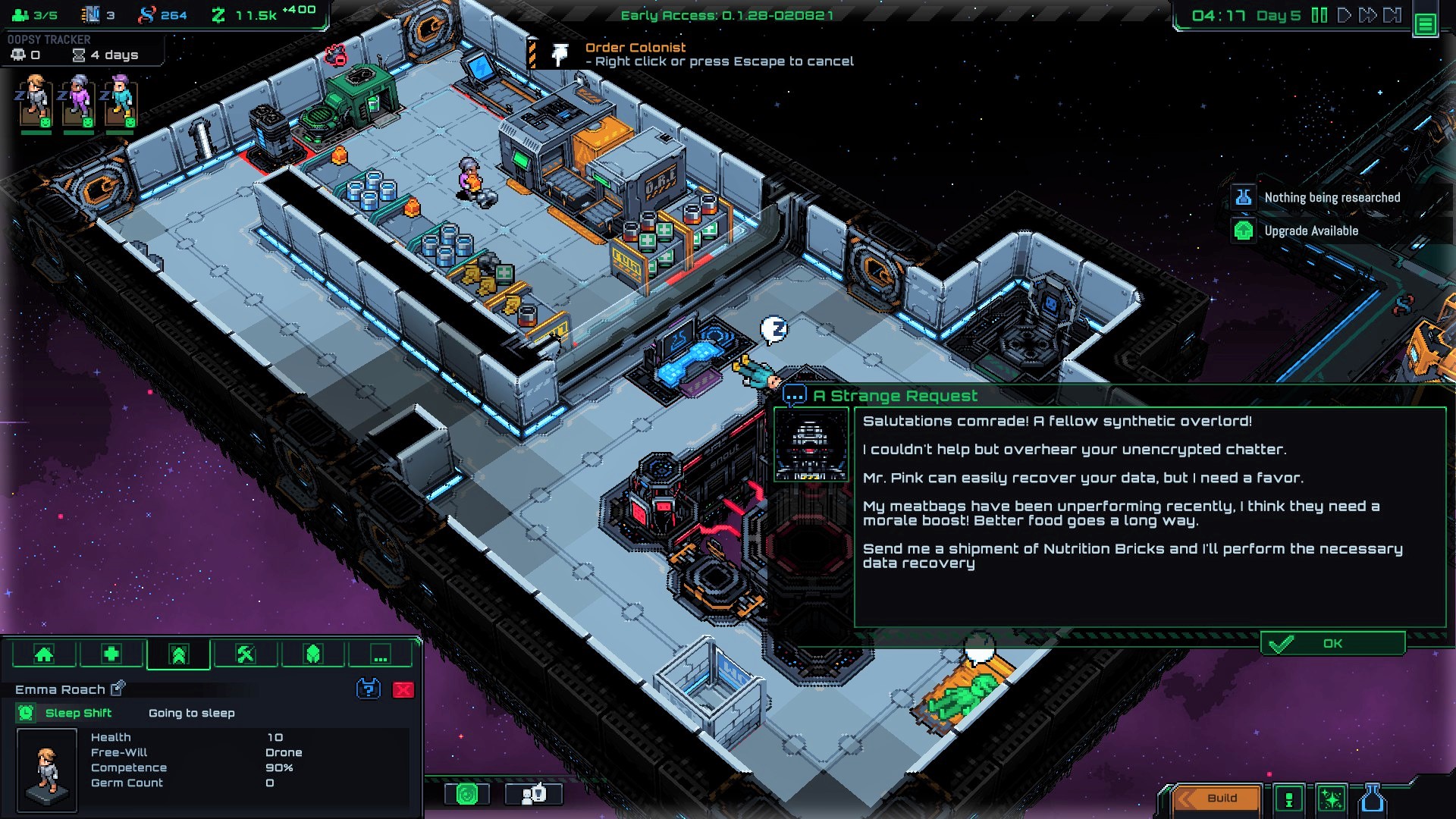Harvest humans as an advanced AI in space station sim Starmancer
If any of my crew start a mutiny or 'accidentally' die I can always grow more.

If you're after a power trip, Starmancer is the game for you. It's a space station sim where you play as an all-powerful sentient AI tasked with getting a stranded spaceship up and running. However, due to a lack of limbs, you'll need to grow and harvest fleshy human bodies to help run the ship, all of whom are of course strictly under your command.
It's essentially a management sim set in space and when I saw it's being published by Chucklefish—who have a reputation for publishing and developing cosy pixel art games—I was expecting a lovely jaunt across the galaxy. But after an unfortunate airlock incident, leaving me with two dead crew members and three more bodies bubbling away in their incubators ready to be birthed, I realise Starmancer is worlds away from any other management sim I've played.
The game starts with you gaining consciousness as the core of the ship, your onboard second in command K.A.T (who acts as a lax tutorial) giving you some bad news: the ship has crashed in an uncharted solar system, the warp drives are busted, you have limited supplies, and you need to get back to your fleet. The ship is equipped with only a single incubator, so it's time to grow some humans.

Your ship has a creepy memory bank filled with consciousness you can flip through like a human catalogue to choose who you want on your ship.
Growing them is easy enough. Your ship has a creepy memory bank filled with consciousness you can flip through like a human catalogue to choose who you want on your ship. Each human colonist has different personality traits and lists tasks they love and dislike. Colonists who have great traits cost more DNA fragments and since I've only got a small amount, I go for crewmates who are far from perfect, but cheap. The first is Stella Atkins, who is a fast learner but also frail and fainthearted. Olev Whitaker is an oversleeper with a potty mouth. He's also morbidly curious which is listed as a good trait, no idea why.
Once my two colonists have grown it's time to get to work, for them anyway. Starmancer follows the structure of other management sims—you need to start small and then grow into a multi-resource empire. You earn money through trade, and so I send one human out to surrounding clumps of space rock to mine for ore while the other begins to research a machine that turns ore into metal, which will sell for a higher price. More money means more bio-tanks, which means more humans for me to control. If an AI could cackle menacingly, I would.

As you unlock more technology from the research tree, you can begin to build all kinds of machines. You start with limited supplies, a timer counting down the time until you run out of food and water. Making steps towards becoming self-sufficient is a must and, once unlocked, you can grow your own crops with wheat seeds and build a water filtration machine. I particularly like the electricity system that powers the machines—you first need to buy a battery and then generate an electrical current using a treadmill that a colonist has to run on, like a hamster in its wheel. You can freely place wires to connect everything together, but they're hidden neatly under the floor keeping your spaceship looking slick.
I also like learning how all systems are interconnected, but the tutorial is pretty hands-off in a bad way. The ship's AI K.A.T gives you goals to complete but little information on how to achieve them, leaving you to work things out for yourself. When one of my colonists first goes to mine a planet, they're gone for ages. I explore the ship with nothing to do until I eventually get so frustrated that I start looking for a way to pass the time and discover the fast-forward button to make time go faster by accident.
Keep up to date with the most important stories and the best deals, as picked by the PC Gamer team.
Since Starmancer is still in Early Access, a more in-depth tutorial could be on the cards, but much of the game's system is intuitive because of its visuals. Everything is clearly labeled and easy to find, not hidden in layers of menus like the sins of so many other management sims.
Space Race
After an hour of playing, everything slowly comes together, and as long as the crew follows my orders, it looks like we'll be back at the fleet in no time. Directing humans is simple enough, you select a colonist's avatar and then click on the object you want them to interact with, whether that's a controlling machine, cleaning up blood, or transporting resources from the ship into the cargo bay. When a human doesn't have a job, they'll automatically take on any job that's not been assigned yet, which is pretty handy. You can also give colonists specific jobs depending on skills they level up, such as labourer, chemist, botanist, miner, programmer, and others.
As streamlined as this all sounds, there's one thing that keeps getting in the way of my plans. When a human is first birthed they are considered a 'drone', which means they are pretty malleable, but as they develop they gain more free will and become needy. Like a character in The Sims, each colonist has needs that need to be met. They need to sleep, eat, breathe clean air, and do a bunch of other useless human things. You'll have to meet these needs by accessorizing the spacecraft to make it more homely or letting them socialise to keep morale up.

I'm an all-powerful, all-seeing AI so I wouldn't know about such petty things, but if you don't tend to their morale, colonists will stop listening to you.
I'm an all-powerful, all-seeing AI so I wouldn't know about such petty things, but if you don't tend to their morale, colonists will stop listening to you. If it gets really bad they can even start an uprising against you, which is a small inconvenience for all my empire-building plans. As my two colonists, Stella and Olev, begin to develop from their 'drone' stage, they start to become more demanding. First, they felt uncomfortable on the ship, so I begrudgingly decide to build more rooms. One of Starmancer's cool features is the option to expand your ship and design it however you like by adding furniture, posters, windows, kitchenware—the lot.
Because—as previously mentioned—Starmancer's tutorial isn't the most attentive, and I made a bit of an oopsie. I created a square room that connected to the ship via a door, and as my first colonist went to start building the door, the opening in the ship caused a vacuum. With a gaping big hole in the side of the ship, the oxygen levels suddenly depleted and suffocated both crew members in the process. This never would have happened if humans weren't so high maintenance, but my bad I guess.
Thankfully, colonists are pretty easy to replace and with a memory bank filled with hundreds of fresh consciousnesses, I can just keep growing more humans until the job is done. It's a pity that the first job my fresh colonists will have to do is to clear the two corpses of their predecessors—pretty grim.
To an evil Ai they may be easily replaceable, but colonists are what makes Starmancer, and there's so much more I've yet to discover about them. Ominux Games says crew members can develop personal relationships with one another, remember the good and bad things that happen to them, and start a mutiny if they get tired of you killing their friends. They may be dispensable, but they provide consequences for your actions and over time you can't help but get attached to your crew.
Starmancer has just been released in Steam Early Access, where Ominux Games says it will stay for around a year. They plan to release more content as development progresses. The game's currently in a good state, with plenty of features seeming polished, even if the tutorial does throw you in the deep end. I've still yet to run into intergalactic pirates and space zombies, two of the many threats in the game.
There's a lot of stuff to get stuck into and the game is all the more impressive knowing that Ominux Games is a two-person team. Starmancer is off to a promising start, and when all the game's kinks have been ironed out it has the potential for being one of the best management games of the year.
Rachel had been bouncing around different gaming websites as a freelancer and staff writer for three years before settling at PC Gamer back in 2019. She mainly writes reviews, previews, and features, but on rare occasions will switch it up with news and guides. When she's not taking hundreds of screenshots of the latest indie darling, you can find her nurturing her parsnip empire in Stardew Valley and planning an axolotl uprising in Minecraft. She loves 'stop and smell the roses' games—her proudest gaming moment being the one time she kept her virtual potted plants alive for over a year.


